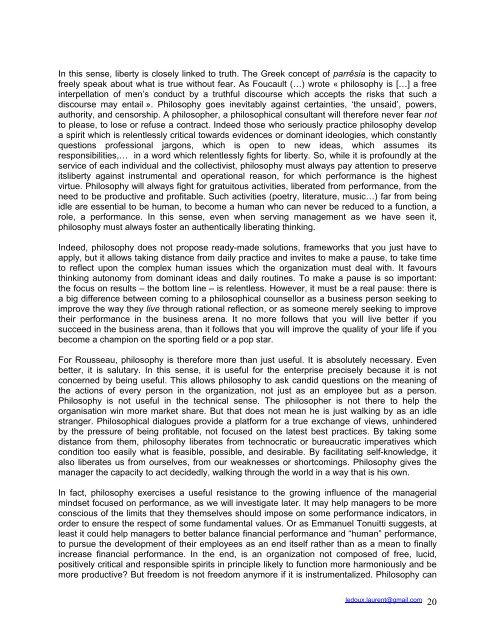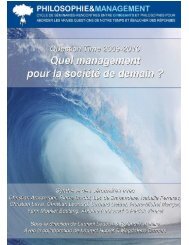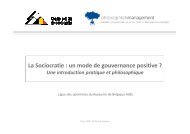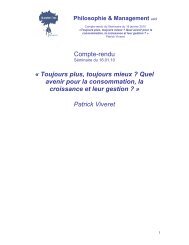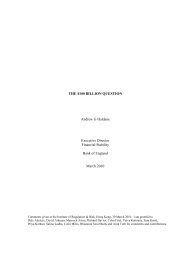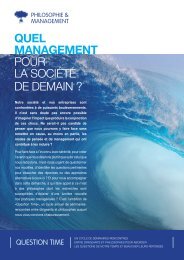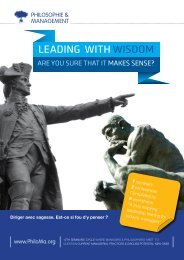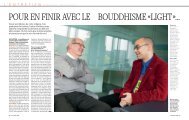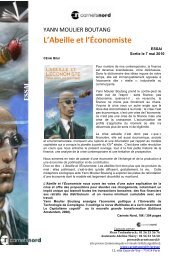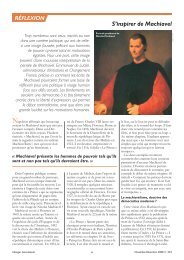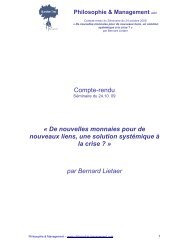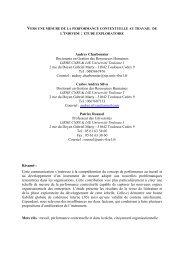Philosophy: The Managers - Philosophie Management
Philosophy: The Managers - Philosophie Management
Philosophy: The Managers - Philosophie Management
You also want an ePaper? Increase the reach of your titles
YUMPU automatically turns print PDFs into web optimized ePapers that Google loves.
In this sense, liberty is closely linked to truth. <strong>The</strong> Greek concept of parrêsia is the capacity to<br />
freely speak about what is true without fear. As Foucault (…) wrote « philosophy is […] a free<br />
interpellation of men’s conduct by a truthful discourse which accepts the risks that such a<br />
discourse may entail ». <strong>Philosophy</strong> goes inevitably against certainties, ‘the unsaid’, powers,<br />
authority, and censorship. A philosopher, a philosophical consultant will therefore never fear not<br />
to please, to lose or refuse a contract. Indeed those who seriously practice philosophy develop<br />
a spirit which is relentlessly critical towards evidences or dominant ideologies, which constantly<br />
questions professional jargons, which is open to new ideas, which assumes its<br />
responsibilities,… in a word which relentlessly fights for liberty. So, while it is profoundly at the<br />
service of each individual and the collectivist, philosophy must always pay attention to preserve<br />
itsliberty against instrumental and operational reason, for which performance is the highest<br />
virtue. <strong>Philosophy</strong> will always fight for gratuitous activities, liberated from performance, from the<br />
need to be productive and profitable. Such activities (poetry, literature, music…) far from being<br />
idle are essential to be human, to become a human who can never be reduced to a function, a<br />
role, a performance. In this sense, even when serving management as we have seen it,<br />
philosophy must always foster an authentically liberating thinking.<br />
Indeed, philosophy does not propose ready-made solutions, frameworks that you just have to<br />
apply, but it allows taking distance from daily practice and invites to make a pause, to take time<br />
to reflect upon the complex human issues which the organization must deal with. It favours<br />
thinking autonomy from dominant ideas and daily routines. To make a pause is so important:<br />
the focus on results – the bottom line – is relentless. However, it must be a real pause: there is<br />
a big difference between coming to a philosophical counsellor as a business person seeking to<br />
improve the way they live through rational reflection, or as someone merely seeking to improve<br />
their performance in the business arena. It no more follows that you will live better if you<br />
succeed in the business arena, than it follows that you will improve the quality of your life if you<br />
become a champion on the sporting field or a pop star.<br />
For Rousseau, philosophy is therefore more than just useful. It is absolutely necessary. Even<br />
better, it is salutary. In this sense, it is useful for the enterprise precisely because it is not<br />
concerned by being useful. This allows philosophy to ask candid questions on the meaning of<br />
the actions of every person in the organization, not just as an employee but as a person.<br />
<strong>Philosophy</strong> is not useful in the technical sense. <strong>The</strong> philosopher is not there to help the<br />
organisation win more market share. But that does not mean he is just walking by as an idle<br />
stranger. Philosophical dialogues provide a platform for a true exchange of views, unhindered<br />
by the pressure of being profitable, not focused on the latest best practices. By taking some<br />
distance from them, philosophy liberates from technocratic or bureaucratic imperatives which<br />
condition too easily what is feasible, possible, and desirable. By facilitating self-knowledge, it<br />
also liberates us from ourselves, from our weaknesses or shortcomings. <strong>Philosophy</strong> gives the<br />
manager the capacity to act decidedly, walking through the world in a way that is his own.<br />
In fact, philosophy exercises a useful resistance to the growing influence of the managerial<br />
mindset focused on performance, as we will investigate later. It may help managers to be more<br />
conscious of the limits that they themselves should impose on some performance indicators, in<br />
order to ensure the respect of some fundamental values. Or as Emmanuel Tonuitti suggests, at<br />
least it could help managers to better balance financial performance and “human” performance,<br />
to pursue the development of their employees as an end itself rather than as a mean to finally<br />
increase financial performance. In the end, is an organization not composed of free, lucid,<br />
positively critical and responsible spirits in principle likely to function more harmoniously and be<br />
more productive? But freedom is not freedom anymore if it is instrumentalized. <strong>Philosophy</strong> can<br />
ledoux.laurent@gmail.com<br />
20


